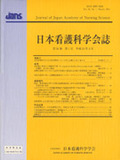Japanese
English
- 販売していません
- Abstract 文献概要
- 参考文献 Reference
要旨
目的:本研究の目的は,治療過程にある進行肺がん患者が症状体験に伴って示す情緒的反応の本質を明らかにすることである.
方法:がん治療過程にあり,調査時に何らかの自覚症状を有するが全身状態が安定している進行肺がん患者10名を対象に半構成的面接によりデータを得た.関係する語り部分をコード化し抽象化を進め,主題・本質を導き出す質的記述的方法により分析した.
結果:症状体験に伴う情緒的反応は14の主題に集約され,【がん悪化への恐れ】【がんであることの自覚】【がん治癒への懇願】などの7の情緒的反応の本質が導き出された.
結論:症状体験に伴う情緒的反応の根底には,がんにまつわる病苦や人間の本質に関わる苦痛が内在しているため,症状理解においては全体性をとらえる視点を持ち身体的苦痛の背後にある情緒的反応にも目を向けることが必要であること,さらに症状緩和においては人間の本質にまで及んだ内面的苦痛や病苦に対する介入が重要であるという示唆を得た.
Abstract
Objective:To elucidate the types of emotional responses associated with the experience of symptoms in patients undergoing treatment for advanced lung cancer.
Methods:Data were obtained by conducting semi-structured interviews on 10 patients undergoing treatment for advanced lung cancer who had subjective symptoms but whose general condition was stable. Relevant statements were encoded and abstracted, and analyzed using a qualitative descriptive method in order to identify the themes and types of emotional responses.
Results:Emotional responses were summarized into 14 themes, and a total of seven types of emotional responses were identified, including “fear of exacerbation of cancer,”“realization that one has cancer,” and “hope for remission of cancer.”
Conclusion:These findings suggest that because the suffering associated with cancer and the pain related to human nature are inherent in the basis of emotional responses associated with the experience of symptoms, it is necessary to take a comprehensive view when understanding symptoms and consider the emotional responses that underlie physical pain, and that interventions for inner pain and the suffering associated with illness that relate to human nature are important in alleviation of symptoms.
Copyright © 2011, Japan Academy of Nursing Science. All rights reserved.


